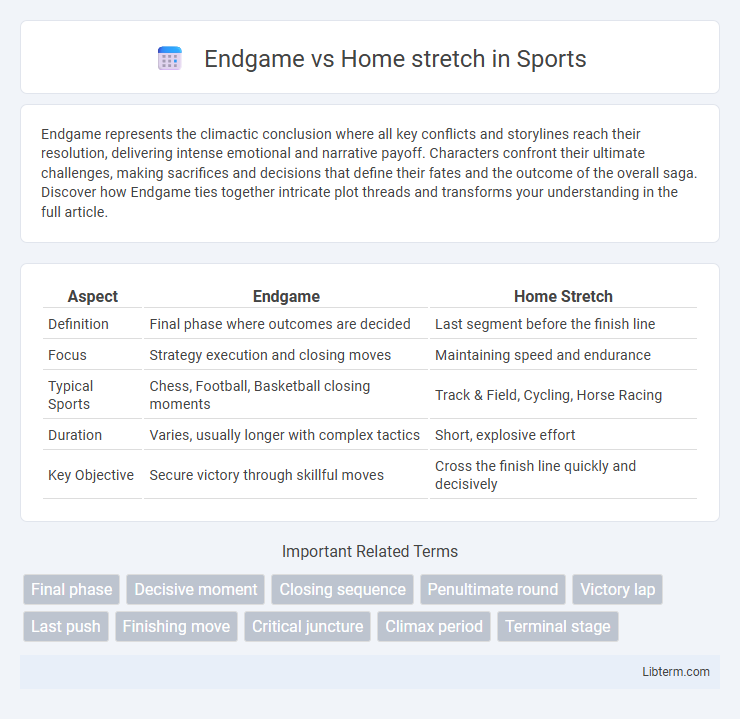Endgame represents the climactic conclusion where all key conflicts and storylines reach their resolution, delivering intense emotional and narrative payoff. Characters confront their ultimate challenges, making sacrifices and decisions that define their fates and the outcome of the overall saga. Discover how Endgame ties together intricate plot threads and transforms your understanding in the full article.
Table of Comparison
| Aspect | Endgame | Home Stretch |
|---|---|---|
| Definition | Final phase where outcomes are decided | Last segment before the finish line |
| Focus | Strategy execution and closing moves | Maintaining speed and endurance |
| Typical Sports | Chess, Football, Basketball closing moments | Track & Field, Cycling, Horse Racing |
| Duration | Varies, usually longer with complex tactics | Short, explosive effort |
| Key Objective | Secure victory through skillful moves | Cross the finish line quickly and decisively |
Understanding "Endgame" and "Home Stretch": Key Differences
The "Endgame" refers to the final phase of a process or project where strategic decisions and outcomes are critical, often requiring meticulous planning and resource allocation to ensure success. The "Home Stretch" describes the concluding part of an effort or timeline leading up to completion, emphasizing momentum and sustained focus to finish strong. Understanding these terms helps differentiate between a phase focused on critical tactical execution ("Endgame") and a period marked by final efforts and perseverance toward project closure ("Home Stretch").
Origin and Etymology of "Endgame" and "Home Stretch
The term "endgame" originates from chess, referring to the final phase of a game when few pieces remain, emphasizing strategy and precision; it derives from the Middle English "end" combined with "game," highlighting conclusion in competition. "Home stretch" comes from horse racing terminology, describing the last straight part of the racetrack leading to the finish line, symbolizing the final push toward completion. Both phrases have expanded metaphorically to signify the concluding stages of any activity or process.
Usage in Popular Culture and Media
The term "endgame" is widely used in popular culture and media to signify the final, decisive stage of a process, often associated with climax or resolution in stories, movies, and video games. "Home stretch" appears predominantly in sports and everyday language, symbolizing the last phase before completion but usually suggests ongoing effort rather than conclusion. While "endgame" carries a tone of finality and strategy, especially popularized by titles like Marvel's Avengers: Endgame, "home stretch" emphasizes perseverance and nearing a goal without implying an absolute ending.
Contexts: When to Use "Endgame" vs. "Home Stretch
Use "endgame" to describe the final phase of a process or event where critical decisions determine the overall outcome, often in strategic contexts like chess or business negotiations. Employ "home stretch" to refer to the last segment or period of a task or activity, emphasizing nearing completion and increased effort, common in sports, projects, or races. Selecting between "endgame" and "home stretch" depends on whether the focus is on decisive resolution ("endgame") or approaching the finish line ("home stretch").
Impact on Audience Perception
Endgame evokes a sense of ultimate resolution and high stakes, leading audiences to anticipate a monumental conclusion that satisfies long-standing plotlines. In contrast, home stretch suggests a nearing end with sustained momentum, fostering engagement through the anticipation of final efforts and outcomes. The choice between these terms influences audience perception by framing the narrative urgency either as a climactic finale or a critical buildup phase.
Endgame Strategies vs. Home Stretch Tactics
Endgame strategies in chess emphasize precise calculation, piece activity, and king safety to convert small advantages into victory during simplified positions. Home stretch tactics focus on capitalizing on accumulated positional or material advantages through forceful moves, threats, and exploiting weaknesses as the game approaches its conclusion. Mastery of endgame fundamentals, including pawn structure and opposition, is essential for transitioning successful home stretch tactics into a winning outcome.
Psychological Effects: Motivation in the Final Phase
The endgame phase triggers heightened psychological pressure that can significantly impact motivation, often amplifying focus and determination to complete tasks efficiently. During the home stretch, individuals may experience fluctuating motivation due to fatigue and stress, requiring mental resilience and goal reinforcement to maintain productivity. Understanding these motivational dynamics is crucial for optimizing performance and preventing burnout as deadlines approach.
Examples from Sports, Gaming, and Business
In sports, the endgame refers to the final moments where strategy shifts to securing victory, such as a basketball team executing a last-second play, while the home stretch indicates the closing segment of a race demanding sustained effort, like a marathon's final miles. In gaming, an endgame scenario occurs when players reach the ultimate objectives or final levels, exemplified by defeating a final boss in an RPG, whereas the home stretch embodies the phase where players intensify actions to complete challenging quests or missions. In business, the endgame involves closing critical deals or achieving key milestones, such as finalizing a merger, while the home stretch represents the last phase of a project or fiscal quarter requiring increased focus to meet targets.
Common Misconceptions and Mistakes
Many people confuse the endgame with the home stretch, mistakenly believing both signify the final phase of a project or process. The endgame specifically refers to the conclusive stage where critical decisions and outcomes are finalized, whereas the home stretch indicates the period leading up to that final phase, focusing on wrapping up remaining tasks. Misunderstanding these terms often results in premature resource allocation or overlooking essential final evaluations, impacting overall success.
Choosing the Right Term: Practical Tips
Choosing between "endgame" and "home stretch" depends on context and tone; "endgame" suits strategic or high-stakes scenarios like chess or business negotiations, emphasizing final moves toward victory. Use "home stretch" to convey the nearing completion of a project or race, implying sustained effort and motivation as the finish line approaches. Consider audience familiarity and emotional impact to select the term that best aligns with your communication goals.
Endgame Infographic

 libterm.com
libterm.com